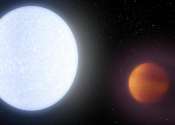Four new 'hot Jupiters' discovered
Astronomers report the detection of four new "hot Jupiter" exoplanets as part of the WASP-south survey. The newfound alien worlds received designations: WASP-178b, WASP-184b, WASP-185b and WASP-192b. The discovery is detailed ...








